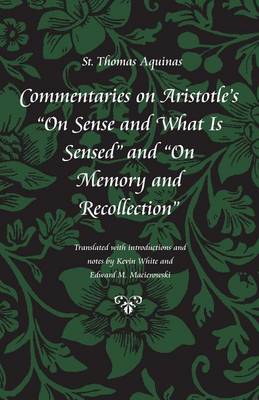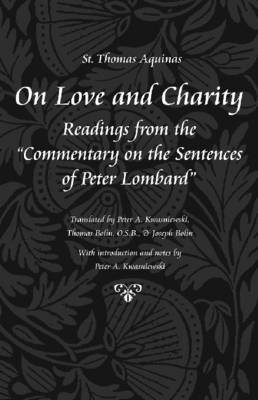Thomas Aquinas in Translation
2 total works
Commentary on Aristotle's "On Sense and What is Sensed" and "On Memory and Recollection"
by Saint Thomas Aquinas
Published 21 December 2004
In keeping with the order found in traditional catalogues of Aristotle's works, Thomas Aquinas began his series of Aristotelian commentaries with a commentary on "On the Soul," which he followed with commentaries on "On Sense and What Is Sensed" and "On Memory and Recollection," written in 1268-70. Until now, these latter two commentaries have never been published in English translation. The translations presented in this volume are based on the critical Leonine edition of the commentaries and include English translations of the Aristotelian texts on which Aquinas commented. The translations of both commentaries are furnished with introductions and notes by the translators. Thomas's commentary on "On Sense and What Is Sensed" clarifies and develops Aristotle's discussion of sense-powers, his "application" of sensepowers to organs and objects, and his concluding questions concerning the object and medium of sensation, and the role of the "common sense." In "digressions" from his literal exposition, Aquinas presents discussions bearing on psychology, epistemology, natural philosophy, and metaphysics.
The first three chapters of the commentary on "On Memory and Recollection" deal with memory and address three questions: "What is memory?" "To what part of the soul does memory belong?" and "What is the cause of remembering?" The last eight chapters, which deal with recollection, also address three questions: "What is recollection?" "How does recollecting take place?" and "What is the difference between memory and recollection?" In "digressions," Aquinas explores more fully the issues arising from the exposition of the text.
The first three chapters of the commentary on "On Memory and Recollection" deal with memory and address three questions: "What is memory?" "To what part of the soul does memory belong?" and "What is the cause of remembering?" The last eight chapters, which deal with recollection, also address three questions: "What is recollection?" "How does recollecting take place?" and "What is the difference between memory and recollection?" In "digressions," Aquinas explores more fully the issues arising from the exposition of the text.
Among the great works of Thomas Aquinas, the ""Commentary on the Sentences of Peter Lombard"" has suffered almost total neglect among translators. Such neglect is surprising, considering that the massive Commentary - more than 4,000 pages in the last printed edition - is not only Aquinas' first systematic engagement with all the philosophical and theological topics on which he expended his energy over the span of a short career but is also characterized by an exuberance and elaborateness seldom found in his subsequent writings. Although Chenu had already drawn attention decades ago to the importance of studying this youthful tour de force for a fuller understanding of Thomas' more mature work, the ""Commentary on the Sentences"" has remained a closed book for many modern students of Thomistic and medieval thought because of its relative inaccessibility in English or in Latin.The present volume, containing all the major texts on love and charity, makes available what is by far the most extensive translation ever to be made from the Commentary with the added benefit that the better part of the translation is based on the (as yet unpublished) critical edition of the Leonine Commission. The collection of texts from all four books has a tight thematic coherence that makes it invaluable to students of Thomas' moral philosophy, moral theology, and philosophical theology. In addition, the inclusion of parallel texts from Aquinas' first (Parisian) Commentary as well as from his second (Roman) attempt at a commentary, the recently rediscovered ""Lectura Romana"", makes this edition all the more valuable for those who wish to track the internal development of Thomas' thinking on these matters.The new availability of so many rich passages from the ""Commentary on the Sentences"" will encourage and facilitate use of a magnificent resource that deserves to be better known.

